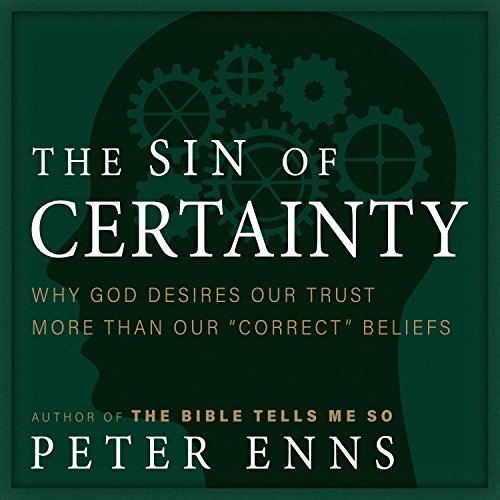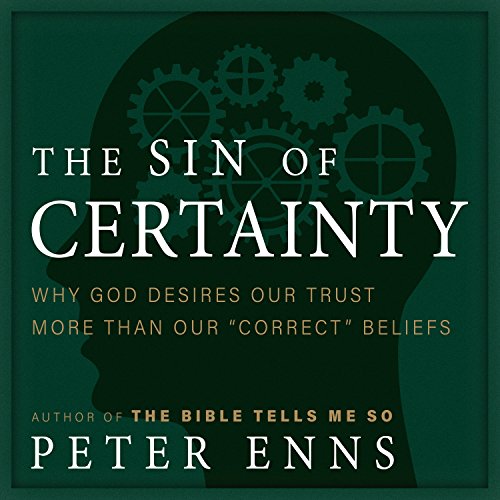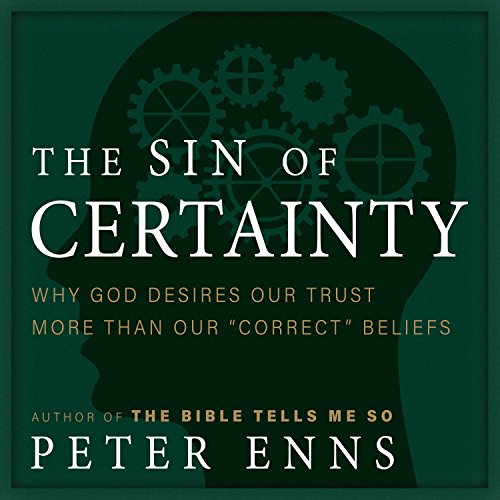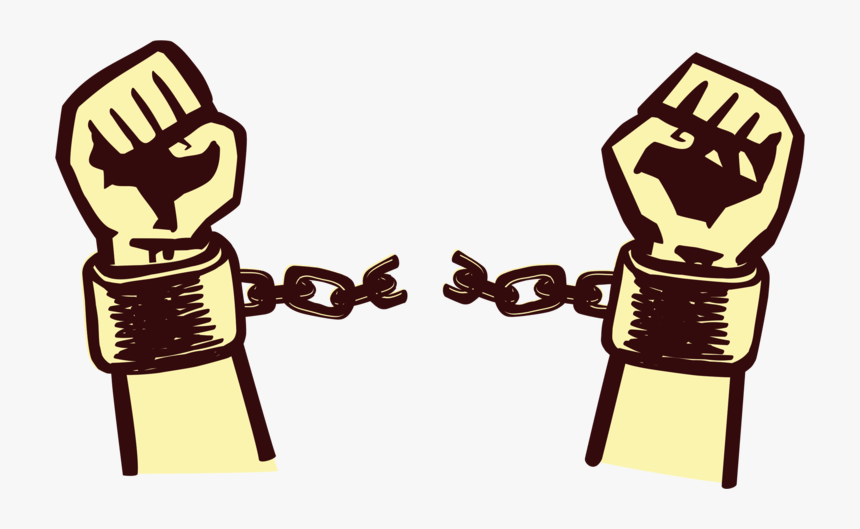
Peter Enns is struggling to keep the faith. Amazingly, for him, things began to crumble while watching a Disney movie on an airplane! All it took was some simple questions asked by child actors about the complexities of belief, and his faith started falling to pieces. He didn’t see that coming. He describes his faith regression as follows:
- I know what I believe
- I think I know what I believe
- I think I thought I knew what I believed.
- I’m not sure anymore what I believe
- I don’t know what I believe anymore
- I have no idea what I believe
- Leave me alone!
This book is Peters Enns’ desperate attempt to keep the faith.
The Big Idea: Faith is not correct thinking about God or the Bible; it’s trusting in God. Faith is not so much about the specifics of what we believe but in whom we trust.
The Big Problem: Belief is not the problem. It’s good to know what to believe. However, a pre-occupation with correct belief is the problem — faith based on knowing correctly what you believe is a disaster waiting to happen. Correct thinking provides a sense of certainty. Thinking we are right about God gives us a sense of order in an otherwise messy world. Fear of losing that handle on certainty leads to a pre-occupation with correct thinking. So we make certain familiar beliefs are defended and supported at all costs. This pre-occupation with correct thinking is the reason behind all the bloody infighting that we find in Christian history, as well as many of the church splits we experience today. Certainty in the world of faith doesn’t belong, and when it shows up, bad things happen! When correct thinking is the priority, then the life of faith is reduced to sentry duty. According to Enns, we have to trust God while at the same time holding our beliefs with an open hand.
The Marriage Illustration: Enns knows people are going to get worried about what he is saying. Not knowing what you believe, and being ok with that? Come on, Enns! So he tries to help us see it differently. A marriage relationship does not depend on a spouse’s correctness of belief about their partner. A successful marriage is not determined by accurate knowledge held with confident certitude. Successful marriages are built on trusting each other and pursuing one another whether or not we understand each other correctly. The same is true with God. It is trust and pursuit that matters, far more than making sure one’s theology is precisely correct by some standard or dogma.
How did we shift from trust to a pre-occupation with correct thinking? Christianity in North America was humming along nicely, says Enns. The Bible was considered reasonable. It was respected. It was “common sense” and generally accepted as historically and scientifically accurate. If one wanted to prove a point, he need only open to a Bible verse, and the matter would be settled. The prevailing assumption was that the Bible provided a sure intellectual foundation for what we believe. “The Bible says it, I believe it, that settles it” was about to get gut-punched. Four knock out blows came in rapid succession over about 30 years, says Enns.
- Darwin was the first punch. There was a lot to his theory, common descent, natural selection, billions of years, but all anyone heard in America was “we came from monkeys the Bible is wrong.”
- Archaeology was the next attack. As professionals dug in the dirt in the 19th and 20th centuries, they discovered that lots of civilizations that pre-date the Jewish one had origin stories, floods, and God gardens. It turns out the Jews recycled stories already in circulation. The Genesis narratives are not definitive words from God; they are co-opted myths from other societies. At this point, Enns mentions that “Bible-believing people started freaking out.”
- The third blow came from the Germans. In their scholarship, they destroyed the idea that Moses wrote the 1st five books of the Bible. Instead, there were several writers, many later date edits and insertions with the whole thing being assembled about 1000 years after the fact. The first five books of the Bible were now without an accurate eye witness. It’s pretty tough to have a supreme level of confidence in a book’s historical accuracy when it comes together a millennium after the events it recounts.
- The final blow was slavery. Both sides of the abolition movement had their proof texts for why it was right or wrong. The conclusion that many drew was that if you can’t trust the Bible to tell you what to do, then what good is it?
Many people lost their faith during this time, but according to Enns, only because they had an over-focus on correct thinking about the Bible. As the Bible goes, so goes Christianity, was the assumption, and the Bible was going down. Many Christians launched into “Intellectual reactive mode” at this point. The Bible has to be right! The information contained in it must be correct, or all is lost. Overnight Bible colleges, Bible churches and Bible conferences started popping up all over North America in defence of the Holy Book. Churches became Biblical information transfer stations with Sunday schools and hour-long sermons focused on correct thinking about the Bible. Holding on to certainty, in particular, about the Bible’s accuracy became all that mattered.
Compounding the problem was the Protestant Reformation: The centrality of the Bible to faith became a thing in the 1500s with Martin Luther. He hated the traditions, corruption and authority of the Catholic Church, one of his breakaway tactics was his cry of “Sola Scriptura” — the Bible alone. Luther translated the Bible into German, so everyone could read it for themselves and let the Scripture be their guide. What followed over the next few centuries was chaos. Denominations multiplied like rabbits. Getting the Bible right became a primary concern. “We are right,” say the Baptists, “and everyone else is wrong!” And so on and so on. Chasing Biblical certainty turns out to be a huge mistake. Denominationalism exists to get thinking about the Bible right, but in the end, it created more doubts than ever about the Bible.
Modernist Fundamentalist Controversy an exercise in missing the point: “The Bible is true,” say the fundamentalists. “No, it’s not,” say the modernists. Defences and attacks on the Bible multiply and abound. But says Enns,
“The Bible is not set up to give the kind of certainty that both groups expected of it… It’s not the Bibles role to give us certainty about what happened in the past…the Bible is fundamentally a tool that helps us learn to trust God.”
So how do we understand the Bible? “What do you do when a holy book doesn’t act like you’d expect it to?” Asks Enns, he has a few answers.
“Adjust your expectations on what the Bible can deliver…The Bible is an ancient book that simply cannot be dropped on our laps without a lot of thought and wisdom. The Bible is a book to be pondered, thought through, tried out, assessed and argued with; all of these interactions with our holy book are expressions of a trusting but uncertain faith.”
Is a faith that walks in uncertainty Biblical? Enns spends a lot of time in Job, Ecclesiastes and Psalms. Certainty goes out the window in these books. The big idea of Ecclesiastes, according to Enns: “It never says you got to know what you believe, rather, trust God even when you don’t know what you believe.”
Faith to Faithfulness: I found this idea communicated in David Bentley Hart as well. The idea behind the Greek word for faith (Pistis) is more of a communal, active word better translated as faithfulness. When the term is used of God, it is never intended so that we understand God as having a confident assertion of some truth. God doesn’t have faith in that sense at all; instead, God is faithful. That’s most often the intended meaning of this word in the New Testament. To have faith is to humbly, faithfully trust God, not know the right things about him.
What is Trust? Trust is letting go; it’s dying. People who trust well don’t have control issues; they don’t need to understand everything. They see a dim sliver of light in the darkness, and they walk towards it. For Enns, five issues exist that destroy intellectual faith. Knowing the right answers isn’t enough in the face of these realities.
- The Bible reveals God as violent, reactive, vengeful, bloodthirsty, immoral, mean and petty, among other things.
- The Bible and science collide too many times to think the Bible has anything valuable to say. (Enns appears convinced of macroevolution in its entirety. In mapping the human genome, it has been proven that humans came from monkeys. The age of the earth is irrefutable; the size of the universe doesn’t help create confidence in the Biblical God. He quotes Carl Sagan, “The pale blue dot is precious to us, but of incalculable insignificance on the grand cosmic scale.” To Enns its both bizarre and unnerving to know the size of the universe and then discover a God in the Bible “who seems preoccupied with tribal skirmishes, making sure his people don’t eat shellfish or pork and demanding that they keep a rigorous schedule of sacrifices to him.”
- Too much suffering. God is too disinterested or can’t seem to do anything about it.
- With globalization, it is becoming impossible to think that Christianity is the only path to God
- Christians treat each other too badly for it to be real.
Enns concludes this disturbing section with the comment.
“Faith that promises firm answers and to relieve our doubt is a faith that will not hold up to the challenges and tragedies of life. Deep trust is the only thing that holds up.”
Clarity is overrated: The story is told of a man named John whose spiritual struggles, led him to Mother Teresa in India
“Pray that I have clarity,” he asks her
“No I will not do that” she responds
“Why?”
“Clarity is the last thing you are clinging to and must let go of it.”
“But you always seem to have clarity.”
Mother Teresa laughs right out loud
“I have never had clarity, what I have is trust, so I will pray that you trust God.”
What does one make of all this talk of uncertain faith? Enns admits he is still in process. His call is for follows of Jesus to embrace “simple, uncluttered faith” To not be preoccupied with correct thinking about God but instead trust God. At the end of the book, you want to ask him, “So what exactly do you believe about God anyway?” But, the point of the book is to get away from all that. Trust isn’t expressed in the correct spelling out of one’s beliefs.
Enns prefers now to sit in a liturgically based Episcopalian church for his spiritual edification. He’s distanced himself from his evangelical roots. He is not interested much in listening to preaching anymore. He prefers instead to contemplate the mysteries of God, to hold doctrine a lot more open-handedly, to read widely and to treat the Scripture merely as a sometimes helpful tool in the life of faith. Is he right?
I resonated with a lot of this book. I’m in a similar place. I’m disillusioned with Christianity at the moment, all my right answers and intellectual defences of the faith are falling flat in my heart, defending the Bible has become especially tiresome. Is there another way? Is “embracing the mystery” and forging ahead with “simple, uncluttered trust” the way forward? Is this answer too easy? Too intellectually mushy? Is God just a complete mystery? Can we have any confidence that we know him, or that the Bible is reliable? Does God tell us what to believe about him and how to act in ways pleasing to him? Surely he speaks, right? Enns isn’t concerned much about these questions – and they are important questions! So that’s a bit of a problem. However, I think his big idea is the correct one. In defending the Bible so rigorously, in fighting for our proper understanding of God, we’ve missed the point of faith. Theological certainty is valued more than trust in God, and that is a huge mistake.
Quote Worthy:
- Knowing has its place, but it’s not at the centre of faith.
- Trusting God with Childlike trust regardless of how certain I might feel takes way more courage than knowing for certain.
- Intellectual faith is ruined by better arguments, and there is always a better argument out there somewhere.
- It is ok to let go of the need to be right.
- Trust is letting go of my need to know.
- Good faith will always complicate our certainties.
- The Bible is less an instruction manual and more an internal dialogue





